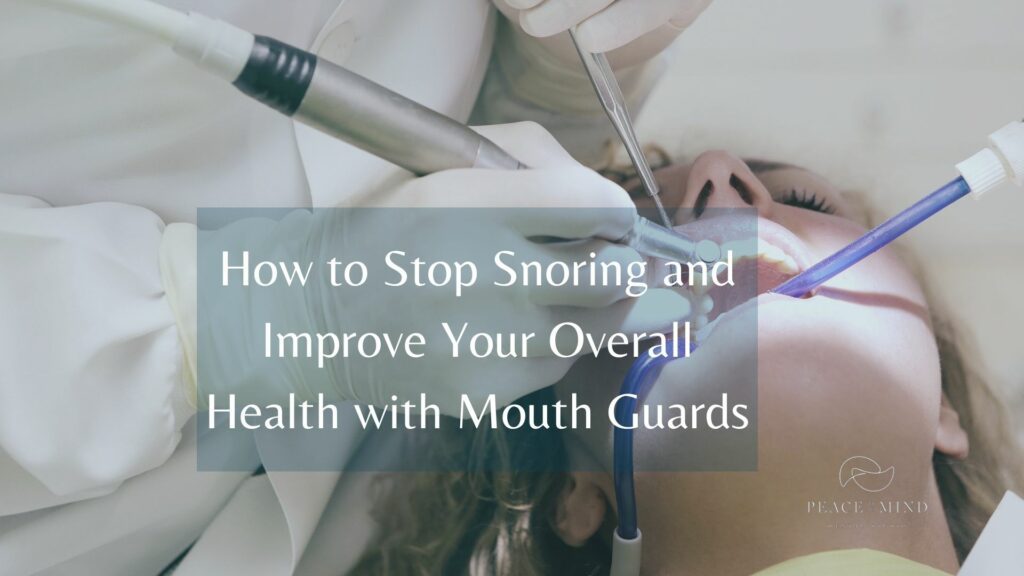
Snoring is a common issue that affects millions of people worldwide. Not only is it annoying to those around you, but it can also lead to serious health problems. Sometimes, snoring can be a symptom of sleep apnea, a potentially life-threatening condition. Fortunately, there are various ways to combat snoring, including using snoring mouthguards.
Mouth guards, oral appliances, or snoring devices are commonly used to treat snoring and sleep apnea. They work by positioning the jaw in a way that helps keep the airway open during sleep, which can reduce or eliminate snoring.
What causes snoring?
Before we discuss how to stop snoring, let’s first understand what causes snoring. Snoring occurs when airflow through the nose and mouth is partially blocked during sleep. This blockage causes the surrounding tissues to vibrate, which produces the snoring sound.
Several factors can contribute to snoring, including:
- Obesity: People who are overweight or obese are more likely to snore due to the extra weight on their neck and throat.
- Age: As we age, our muscles and tissues lose elasticity, which can lead to snoring.
- Smoking: Smoking irritates the throat and can cause inflammation, leading to snoring.
- Alcohol and sedatives: These substances can relax the muscles in the throat, leading to snoring.
- Allergies and congestion: Nasal congestion and allergies can cause airway blockages, leading to snoring.
How to Stop Snoring With Snoring Mouth Guards
Here are some tips on how to stop snoring and improve your overall health with snoring mouthguards:
1. Visit your dentist
Before you start using a mouth guard, visiting your dentist in Chandler is essential. They can help determine the cause of your snoring and recommend the best mouthguard for your needs. In some cases, snoring can be a symptom of a more serious condition, such as sleep apnea. Your dentist may refer you to a sleep specialist if they suspect this is the case.
2. Choose the Right Type of Mouthguard
Various types of mouthguards are available, each with its benefits and drawbacks. Some of the most common types include:
- Mandibular advancement device (MAD): This mouth guard is designed to slightly position the lower jaw forward. This helps keep the airway open during sleep, reducing or eliminating snoring. MADs are typically adjustable to find the right fit for your jaw.
- Tongue retaining device (TRD): TRDs hold the tongue in place during sleep, which can help keep the airway open. This type of mouth guard is often recommended for people who snore due to tongue obstruction.
- Custom-made mouth guard: If your dentist determines you need a mouth guard, they may recommend a custom-made device. These are created specifically for your mouth, ensuring the best fit and comfort.
- Boil-and-bite mouth guard: Boil-and-bite mouth guards can be purchased at many drugstores and sports stores. They’re designed to be boiled in water, then molded to your teeth for a better fit. While these mouthguards can be effective, they may not be as comfortable as custom-made devices.
3. Wear your mouth guard consistently
Once you’ve chosen the correct type of mouth guard for your needs, it’s essential to wear it consistently. This means wearing it every night, even when you don’t feel like you need it. Consistency is vital to get the full benefits of a snoring mouthguard, so make it a bedtime routine.
4. Practice good oral hygiene
Maintaining good oral hygiene is essential when using a mouth guard. Brush and floss your teeth thoroughly before bed, and clean your mouth guard regularly. This can help prevent bacteria buildup, leading to bad breath and other dental issues.
5. Consider other lifestyle changes
Although mouthguards can effectively reduce snoring, they may not provide a complete solution. Making other lifestyle changes can also help improve your sleep quality and reduce snoring. Here are a few tips:
- Maintain a healthy weight: Excess weight can pressure the airway, leading to sleep apnea and snoring. Maintaining a healthy weight through exercise and diet can help reduce snoring.
- Avoid alcohol and sedatives: Alcohol and sedatives can relax the muscles in the throat, making snoring worse. Avoiding these substances before bed can help improve sleep quality.
Benefits of Mouth Guards for Overall Health
1. Protects Teeth from Injury
Mouth guards are commonly used to protect teeth during sports activities. Sports such as football, hockey, and boxing involve high levels of physical contact, and without the proper protection, teeth can easily be damaged or knocked out. Wearing a mouth guard protects the teeth from impact, reducing the risk of injury.
2. Improves Sleep Quality
The use of mouth guards aids in treating sleep apnea and snoring.
3. Prevents Teeth Grinding
It is also known as bruxism when the teeth are clenched or ground together during sleep. This can lead to tooth damage, headaches, and jaw pain. Mouth guards can prevent teeth grinding by providing a barrier between the teeth, reducing the likelihood of tooth damage and other symptoms.
Final Words
Don’t let snoring ruin your health and quality of life. By visiting Peace of Mind Dental Studio in Chandler, you can get personalized advice from our dental experts, who can help you choose the right type of snoring mouth guard for your needs.


